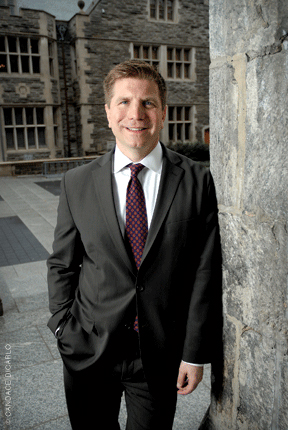
“Twenty-five years ago I was this kid sitting in front of Weightman Hall, really questioning why I was here, because it seemed so far from home in so many ways, academically, socially—there weren’t any students from Bishop Scully High School in upstate New York coming here. And so thinking about what this place really provided for me became a very strong pull,” says Eric Furda C’87, explaining his decision to return to the University as dean of admissions [“Gazetteer,” Mar|Apr].
Furda has spent most of his career working in college admissions, starting at Penn right after graduation and moving to Columbia University after four years on the job here. He eventually rose to become that school’s executive director of undergraduate admissions from 1995 to 2004 (a period in which applications went up about 70 percent) before taking on the position, a new one at Columbia, of vice president of alumni relations. That move was motivated more by the desire for a new challenge at Columbia than by any weariness with admissions work in general, and Furda admits that the idea of succeeding Penn’s longtime admissions dean, Lee Stetson GEd’71—the person who admitted him to Penn and gave him his first job—had always been at the back of his mind.
Furda won’t officially take over until July, and in the meantime is serving as a special assistant to President Amy Gutmann. Occupying borrowed space in the secretary of the University’s office, upstairs from his future office in admissions at 1 College Hall, he says he has been reacquainting himself with Penn, talking with deans, faculty, and student leaders, and generally trying to stay out of the way of interim dean Eric Kaplan while the current year’s admissions cycle has played out. (Kaplan, associate secretary of the University, stepped in when Stetson, who had initially announced he would retire in June 2008, instead departed abruptly and for reasons still unexplained last summer.)
Furda didn’t have any more to say than anyone else has on that subject, but he spoke with Gazette editor John Prendergast about coming back to the University and his plans for the next era in Penn admissions, and also offered some tips for surviving the college applications process.
What made you want to come back to Penn?
When admissions searches took place [at other institutions], I never put my hat in the ring. And obviously, everyone receives phone calls—whether you deserve it or not, you always get the calls. And it was never really a consideration for me to go to another institution, whether it was to have a different quality of life, by going to a small New England college, or heading out to the West Coast or anything like that. But the pull of coming back to Penn was really very strong. And I’ll add that both President Gutmann and Provost Daniels are very convincing because they’re obviously a very strong team. Given where Penn is right now—in a campaign [that includes] a lot of opportunities for students with financial aid—it was clear that the resources and the commitment were in place that Penn could attract the types of students we want to have here.
How do you look at the Alumni Council on Admissions? Is that office unique to Penn, and how does it relate to the overall work of the admissions office?
I don’t know of other places that have anything quite like the ACA. This is a process that has become increasingly competitive. We all know the numbers. Outside of the numbers, a place like Penn, with a rich history, has to really be mindful and respectful of all the generations that were here, that made the place what it is today. And we know that the loyalty and support of alumni is critical for an institution, and we shouldn’t apologize about that. I think it’s proper to have a group of individuals who can be devoted as advocates for the children and the grandchildren of alumni in this process.
I think a group like ACA should be viewed as counselors, and this is the responsibility of all our officers as well. I hope that people will listen to what I have to say, and what our officers will have to say, and what people at the ACA will have to say, about how to navigate this process. And the end result isn’t exclusively about getting in or not getting in to Penn—at the same time recognizing that’s what the people are hoping for.
What’s it like to come into a program that’s been run by the same person for 30 years?
I was here early enough to be aware of how the place was changing, even in the 1980s. Penn was always held in high regard for its recruiting, its marketing. Three decades ago, you would never use the word marketing, as it relates to college admissions. And a handful of people, including Lee, helped change that.
When I think about my four years in [Penn’s] admissions office, I was surrounded by very, very talented professionals in admissions and college counseling. Lee believed in really thinking about marketing the place, and travel, and doing direct mail, and even admissions videos, which everyone didn’t have—but what he really, really taught me is you need good people. We’re going to build on the successes that have been put in place over the last three decades.
Now to step into this role, I’m certainly going to take everything that I learned from my four years here, but at Columbia I had very different experiences. It was a place that had at the time probably the lowest number of applications in the Ivy League. I was very fortunate. There are a lot of things that are beyond your control, and the changes that took place in New York at the time that I was there directly influenced and assisted the increase in applications to Columbia.
Is there anything in particular you’d like to bring from your time at Columbia to Penn?
Probably for restrictions of space and maybe because we didn’t have as developed a program in some ways at Columbia, we were a pioneer in the use of technology in evaluating students—having a digital imaging system, character recognitions of forms. So we’re lifting the printed word and getting it into a digitized dossier. At Penn, as an example, this is the first year that a lot of the system for interviews by the secondary school committees was put online and allowed people to go in instead of having a printed form. We did that about 10 years ago at Columbia. And the digital imaging system we implemented six years ago. I say that not as a put-down—Penn still really is one of the earliest schools in our peer group to have something like this. But I think it’s definitely a place where I can contribute ideas just because we went through an implementation like this.
We’re going to look to some best practices to really consider how we can communicate what Penn has to offer, in a manner that 17- and 18-year-olds will really pay attention, digest, respond, and embrace it. And all of that is constantly moving under our feet. The challenge is, we have to do this with the sense still that this is an Ivy League institution with history and tradition, and balance that with the technologies now at our disposal.
One issue in admissions has been the debate over the value of early-decision programs, with a couple of schools either downgrading or eliminating their programs. Penn responded: We think this is a good program, we’re going to stick with it [“Gazetteer,” Nov|Dec 2006]. What’s your sense of that?
All institutions should make decisions that are right for their school. We’ll always be mindful of impact in the marketplace, what it means for students, what it means for families going through this process. At the end of the day, Penn has to make a decision that is best for Penn, and communicate why we feel that way.
There’s a certain type of class you would like to enroll, and there are different ways of getting there. I want to make sure that President Gutmann can stand in front of the class each year, and feel strongly that this is the best class that has entered the University of Pennsylvania. Having an early-decision program is one of those tools that an admissions office can use to ultimately get the class they wanted that next fall.
And if we do our jobs of getting the word out earlier and to a wide range of populations that Penn is accessible because of our financial-aid policies, we may see this as a great opportunity for many families, regardless of their backgrounds.
The other big recent development has been that ramping up of financial-aid programs, at Penn and elsewhere [“Gazetteer,” Mar|Apr].
I think at the macro-level it’s wonderful that there is so much in the news right now—with the changes in policies across a number of institutions, including some small liberal-arts colleges—that places are making college affordable.
But what I’m most interested in is [ensuring] that when students are here they can take full advantage of being here. A student may be working for the school newspaper, or be a student athlete, have a co-curricular pursuit that they are interested in and that helps them develop. They may also have a work-study job, but they are getting real experience, and they are earning some money by doing that. But then you may see them somewhere else, because you’re going out to dinner downtown, and all of a sudden, they’re the bar-back, or they’re the waiter or waitress.
If [financial need] is taking away from the time that the student could really take advantage of during their time here, then there is a real lost opportunity for that student, there is a lost opportunity for Penn. For me the student experience and being able to take full advantage of the four years that they have here is directly tied to how they are funding their education.
This year’s admissions cycle is over, but do you have any advice for prospective students or alumni parents in the future?
The first thing is that there are so many schools that can really meet your needs as a student. Think about the characteristics of places and the characteristics of a school that you’d like to see. Try to put together maybe five or six of those priorities. If you hit on all six, congratulations. But if you could hit on four of them, you’ll probably be pretty darn happy.
And then, once you decide on those places, even if you’re using a common application, still realize you’re speaking to that school. Whether it’s through the supplement or maybe another piece that you’d like to communicate, I want to know that you understand Penn and why you’re applying here.
When you’re in the process—and I put this in the context of there being a lot of coaching out there, essay-writing, whatever the case may be—be as authentic and true to yourself as you can be about what you are looking for and authentic in your voice as it comes across in the application. That’s going to resonate a lot more with an admissions office than something that’s feeling too polished written by a 30-year-old.
If you did everything in the front end, you’re going to find that you are on a campus that meets your needs. And you’ll find that you really ended up in a great place. Don’t go into [the process] just saying, “There’s only one school in the world for me.” There isn’t … unless of course it’s Penn.




